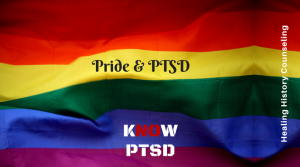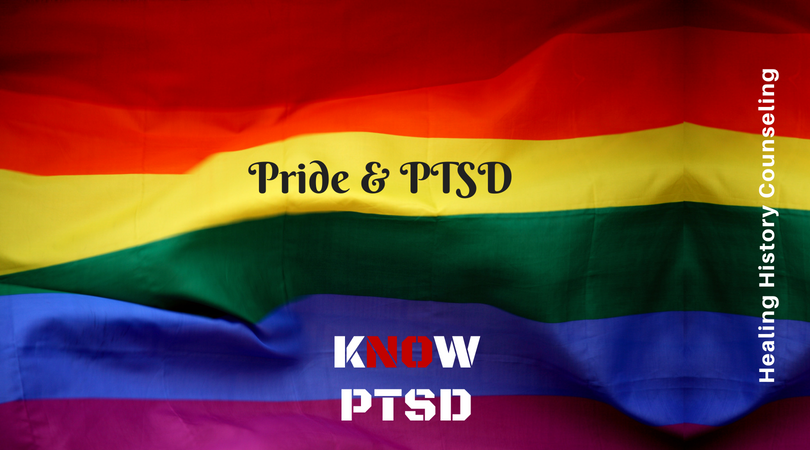

June is LGBTIAQ Pride month and it is also PTSD Awareness month. As a nod to these two focuses, I want this blog to speak to PTSD in the LGBTIAQ community. Let me start by saying that like everyone else, LGBTIAQ (Lesbian, Gay, Bi-Sexual, Transgender, Intersex, Asexual, and Queer/Questioning) people can develop PTSD (Post Traumatic Stress Disorder) from all the same experiences that can create PTSD in the general population: War, car accidents, childhood abuse or neglect, extreme weather events, domestic violence, racism, bullying, and any other traumatic event. Among people who experience events that may lead to PTSD, a LGBTIAQ person is no more or less likely to develop PTSD than the general population. Unfortunately, a LGBTIAQ person is more likely to experience the events that can lead to PTSD. This is because, in addition to all the regular events that can cause PTSD, the LGBTIAQ individual is at risk of experiencing additional trauma due to societal and interpersonal response to their being LGBTIAQ. Although the USA has made great strides towards acceptance and equal rights during the last 50 years, there is still progress to be made and recent backsliding to be undone. It can be easy when you live in a liberal community, such as Austin, or when you surround yourself with people who are accepting of (or members of) the LGBTIAQ community to forget that other parts of the country and other people can be far less accepting or tolerant. When I share everyday homophobic events that I have experienced, my experiences are often greeting with shock and disbelief from well-intended non-LGBTIAQ people.
Types of trauma that LGBTIAQ individuals may experience
- Family rejection (LGBTIAQ youth have higher rates of homelessness)
- Verbal, physical or sexual attacks to make a LGBTIAQ individual not LGBTIAQ
- Conversion therapy (the American psychological and counseling associations both reject the therapeutic effectiveness of conversion therapy and both state that conversion therapy causes harm and that their members should avoid using it). Despite that many states still allow conversion therapy.
- Many small hurts and hates that compound over time
- Internalized LGBTIAQ hate, many LGBTIAQ individuals struggle with their own negative beliefs about being LGBTIAQ
- Community or religious judgement or rejection
- Verbal, physical or sexual attacks due to hate and fear
- Murder (the transgender community, and more so Black transgender individuals, are murdered at significantly higher rates than the general population)
On top of the traumas that LGBTIAQ people can experience, they also often live in locations where they are not protected by the laws. Depending on where you live there can still be consequences for being LGBTIAQ. Every state is different, but here’s a list of many of the possible legal issues LGBTIAQ people may face:
- Not included in hate-crimes laws (TX*)
- Not protected against bullying or discrimination in school (TX*)
- Teaching about LGBTIAQ topics illegal (TX)
- Not allowed to adopt (TX*)
- Can be denied access to romantic partner in hospitals or care facilities (TX*)
- Parents can force conversion therapy for their LGBTIAQ children (TX)
- Can be refused housing or hotel accommodations
- Can be fired for being LGBTIAQ (TX)
- Has religious exemption laws (TX)
- Can be denied partner benefits (insurance, family leave etc.) at job (TX)
- State license and birth certificate cannot be changed to match transgender gender identity (TX)
- Discriminatory bathroom laws
*Texas law either partially protect or does not specify inclusion in laws. When laws do not specifically protect, then LGBTIAQ individuals must depend on weather the people they interact with are prejudice or not.
Unfortunately, LGBTIAQ people may also face additional challenges when seeking a professional therapist or counselor to help them process their experiences. All the national organizations that support professionals who provide mental health treatment specify that discrimination is unacceptable. All the professional organizations also have the expectation that their therapists and counselors will actively work to be well informed on LGBTIAQ issues. Despite these expectations, it is possible to find a prejudice or uninformed therapist. It can be frustrating and impede the effectiveness of therapy if the LGBTIAQ individual feels judged, misunderstood, or that they must teach their therapist about LGBTIAQ issues and experiences. To avoid this many people in the LGBTIAQ community will seek out a therapist who is also LGBTIAQ. Unfortunately, this does not guarantee that the LGBTIAQ therapist understands, isn’t struggling with their own LGBTIAQ, or that they are well informed about the groups that they are not specifically members of (for example: a gay therapist may not be well informed about the experiences or issues faced by an individual who is intersexed or asexual). It is also possible for a LGBTIAQ individual to be prejudice against some other LGBTIAQ group; The most common LGBTIAQ prejudice is against bisexuality and prevalent race-based stereotypes. Unfortunately, a therapist can believe themselves capable of working effectively with LGBTIAQ people and still fail to be a good therapist for a specific individual or a particular area of LGBTIAQ issues.
Finding a LGBTIAQ competent therapist or counselor
- Look for indications on their website. Do they specifically address their ability to work with LGBTIAQ individuals? Do they list LGBTIAQ issues as a specialization they work with?
- Ask them about their ability to work with LGBTIAQ and more specifically your particular identity
- Talk about this aspect of your identity. Pay attention to how well they handle it.
- Do you feel heard, seen, accepted?
- Do you find you have to teach and explain frequently?
- Do they seem to think your LGBTIAQ identity is the cause of your problems, even when you make clear that you disagree? (For example: Do they blame your romantic relationship communication issues on your LGBTIAQ identity?)
- If you feel that the therapist isn’t knowledgeable or accepting enough, you may want to find another therapist. It can be difficult to start over with another therapist, but at times it can be a better choice.
Perhaps you are not a member of the LGBTIAQ community, but you want to be supportive and helpful. Here are some tips for supporting a LGBTIAQ friend or family member who is struggling with PTSD:
- Believe. You may find it hard to believe such hate or stupidity still exists but it’s important to suspend disbelief and accept their truth.
- Don’t excuse. Many hurtful hateful actions are done out of ignorance, because of the person growing up in an older time, or just aren’t meant to be harmful. Telling someone that the harm was unintended while it may be true, won’t be helpful. It will leave them feeling unheard and that their pain doesn’t matter to you.
- Listen. Let them tell their story. Make sure they know you are listening (turn towards them, look at them, make encouraging non-word sounds “ooh”, “hmm”, etc).
- Understand. Make sure they know you understand. The best way to make sure they know is to rephrase what they say back to them.
- Empathize. Connect to their emotion. You can do this by thinking of a time when you felt a similar emotion and connecting to the emotion of that memory. A great way to let them know you empathize is to tell them what they are feeling: “that is terrifying” “that made you mad”. If you get it right, they will feel really understood. If you miss, they’ll correct you and know you’re trying to understand.
- Validate. Acknowledge that they have the right to be upset, hurt, or angry. Agree that what happened was wrong or shouldn’t have happened (assuming you actually agree).
- Support. Ask them how you can help. If they don’t know, make a specific offer. If someone is feeling depressed or overwhelmed they may not be able to think of any way to help themselves nor for you to do to help. A specific will solve that problem (“How about Saturday I come over and we play video games” “How about tomorrow we go to the park” “How about I go with you to the police station” or whatever you actually can do to help, and they want you to do). Suggest they seek professional help if it continues to be upsetting or they seem to be getting worse.
The LGBTIAQ community has rates of PTSD that are twice as high as the general population. People who are LGBTIAQ are not more susceptible to PTSD, but they do experience more traumatic events that can lead to PTSD.
Great post! Very informative and well-written. Looking forward to more content from this blog!Thank you
Your writing resonates with me.